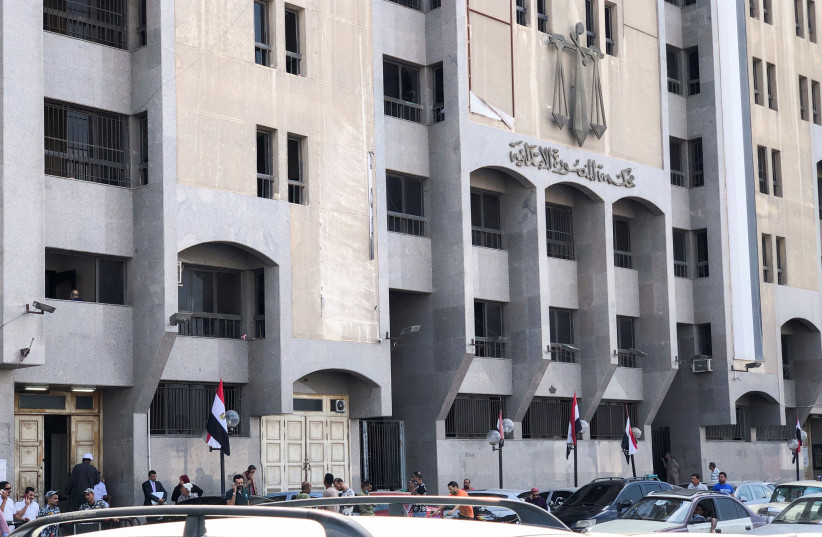Various organizations are raising alarms over a human rights crisis in Egypt as the saga of a detained human rights researcher comes to an end. The researcher, Patrick Zaki, was pardoned by Egypt last month after almost two years in preventative detention for the crimes of “disseminating false news” and “inciting to protest.”
For more stories from The Media Line go to themedialine.org
“Patrick’s case is emblematic of a slew of gross rights abuses that continue to be perpetuated by the Egyptian regime on a really broad scale,” Sheridan Cole, an advocacy associate at the Project on Middle East Democracy, told The Media Line.
“That includes really oppressive restrictions on the activities of independent civil society actors and organizations, a near absolute lack of academic freedom and freedom of expression, … the targeting and prosecution of activists and rights defenders through a rubber stamp judiciary, … and the ongoing hardship that is faced by minority communities.”
What is the state of human rights violations in Egypt?
Zaki, a Coptic Egyptian postgraduate student at the University of Bologna, Italy, had traveled home to Egypt in February 2020. Upon his arrival, he was arrested for having written an article in 2019 criticizing Egypt’s treatment of the minority Coptic Christian population.
Coptic Christians make up about 10% of Egypt’s population. Discrimination against Copts in Egypt is well documented by the UN as well as various human rights organizations.
After serving 22 months in preventive detention, Zaki was sentenced to three years in prison. The day after his sentencing, he was pardoned by Egyptian President Abdel Fattah el-Sisi. He returned to Italy immediately after his release.

Claudio Francavilla, senior EU advocate at Human Rights Watch, told The Media Line that Zaki’s detainment was part of “the broader pattern of repression in Egypt, which is basically to label everybody deemed to be remotely associated with the Muslim Brotherhood, or anyhow a critic of the government, as a terrorist, as a threat to the national security of Egypt.”
“What has been going on in Egypt since the coup, since [Sisi] took power, has been a steady, brutal deterioration of the human rights situation in the country,” Francavilla said.
Since Sisi came to power in 2014, over 60,000 Egyptians have been detained as political prisoners, according to local and international human rights groups. These prisoners can be held in pretrial detainment for up to two years and are subject to physical and psychological torture.
“These are individuals who are detained for exercising freedom of expression, freedom of assembly, really basic things, and they should never have spent a day of their lives behind bars,” Cole said.
The Egyptian government has denied the allegations of systemic torture. Just last week, Moushira Khattab, who serves as president of Egypt’s quasi-governmental human rights institution, compared an Egyptian prison complex to a five-star hotel.
Cole said that Egypt’s purported human rights efforts, including its Presidential Pardons Committee, need to be recognized by the US and other governments as “a façade to whitewash the regime’s human rights abuses on the international stage.”
Zaki’s arrest spurred a widespread international call for his release, especially from the Italian and US governments. Relations between Egypt and Italy have been strained since the 2016 torture and murder of Italian doctoral student Giulio Regeni in Egypt. Egyptian officials have denied that the country played any role in Regeni’s death.
Francavilla described Egypt as a “human rights black hole” and characterized the international community’s response to the various human rights violations in Egypt as “reproachable.”
“It’s really a case of hypocrisy from the Western partners of Egypt, who have taken a very short-sighted approach to stability at the expense of the lives and freedoms of so many people in Egypt,” Francavilla said. “This has emboldened the regime and allowed it to thrive.”
Cole, on the other hand, said that Zaki’s pardon suggests that international pressure might be succeeding to change Egypt’s treatment of detainees as well its approach to human rights overall.
“The speed of [Zaki’s] release shows the effectiveness of this kind of continued, targeted, coordinated pressure on the Egyptian government on human rights by partner governments and civil society organizations,” he said. “I think it’s an important reminder that this kind of tenacious advocacy can yield results and impact the ongoing repression in the country.”
Hannah Levin is a student at Northwestern University and an intern in The Media Line’s Press and Policy Student Program.
